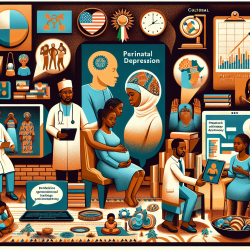Understanding Perinatal Depression in Nigeria: A Cultural Perspective
Perinatal depression is a significant concern globally, but its impact is particularly profound in low- and middle-income countries like Nigeria. The study titled "Perinatal depression in Nigeria: perspectives of women, family caregivers and health care providers" provides a deep dive into the cultural nuances influencing this condition. As practitioners, understanding these cultural contexts can enhance our approach to therapy and improve outcomes for women experiencing perinatal depression.
The Cultural Context of Perinatal Depression
The research highlights how perinatal depression in Nigeria is deeply intertwined with social and cultural factors. Women, family caregivers, and health providers identified various idioms of distress and causal explanations for depression. These included social issues such as lack of support from husbands, family conflicts, and societal expectations regarding gender roles.
Understanding these cultural idioms is crucial for practitioners. For instance, the term "thinking too much" is a common idiom of distress that reflects excessive rumination linked to interpersonal and social challenges. Recognizing these expressions can help practitioners develop culturally sensitive interventions that resonate with the lived experiences of women in Nigeria.
Implications for Practice
For practitioners, integrating cultural understanding into clinical assessments and interventions is essential. The study suggests that narrative-based methods can be effective in exploring local meanings of depression. By employing these methods, practitioners can better understand the social contexts that contribute to perinatal depression and tailor interventions accordingly.
Moreover, practitioners should consider the role of family dynamics and societal expectations in their therapeutic approaches. Encouraging family involvement and addressing societal norms can be beneficial in creating a supportive environment for women experiencing perinatal depression.
Encouraging Further Research
While this study provides valuable insights, there is a need for further research to explore the complexities of perinatal depression in different cultural contexts. Practitioners are encouraged to engage in or support research that investigates the cultural dimensions of mental health conditions. Such research can inform more effective and culturally appropriate interventions, ultimately improving mental health outcomes for women worldwide.
To read the original research paper, please follow this link: Perinatal depression in Nigeria: perspectives of women, family caregivers and health care providers.










